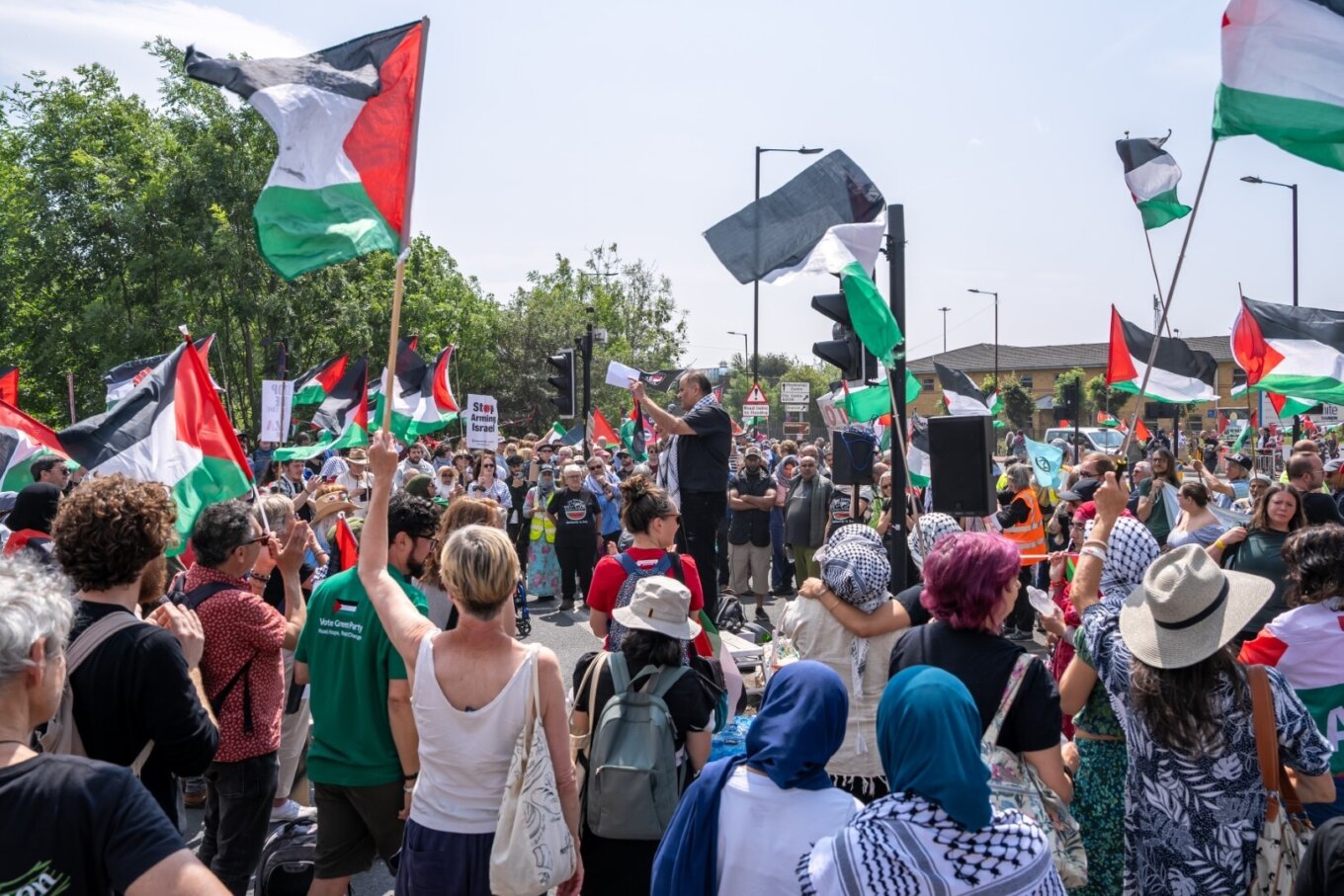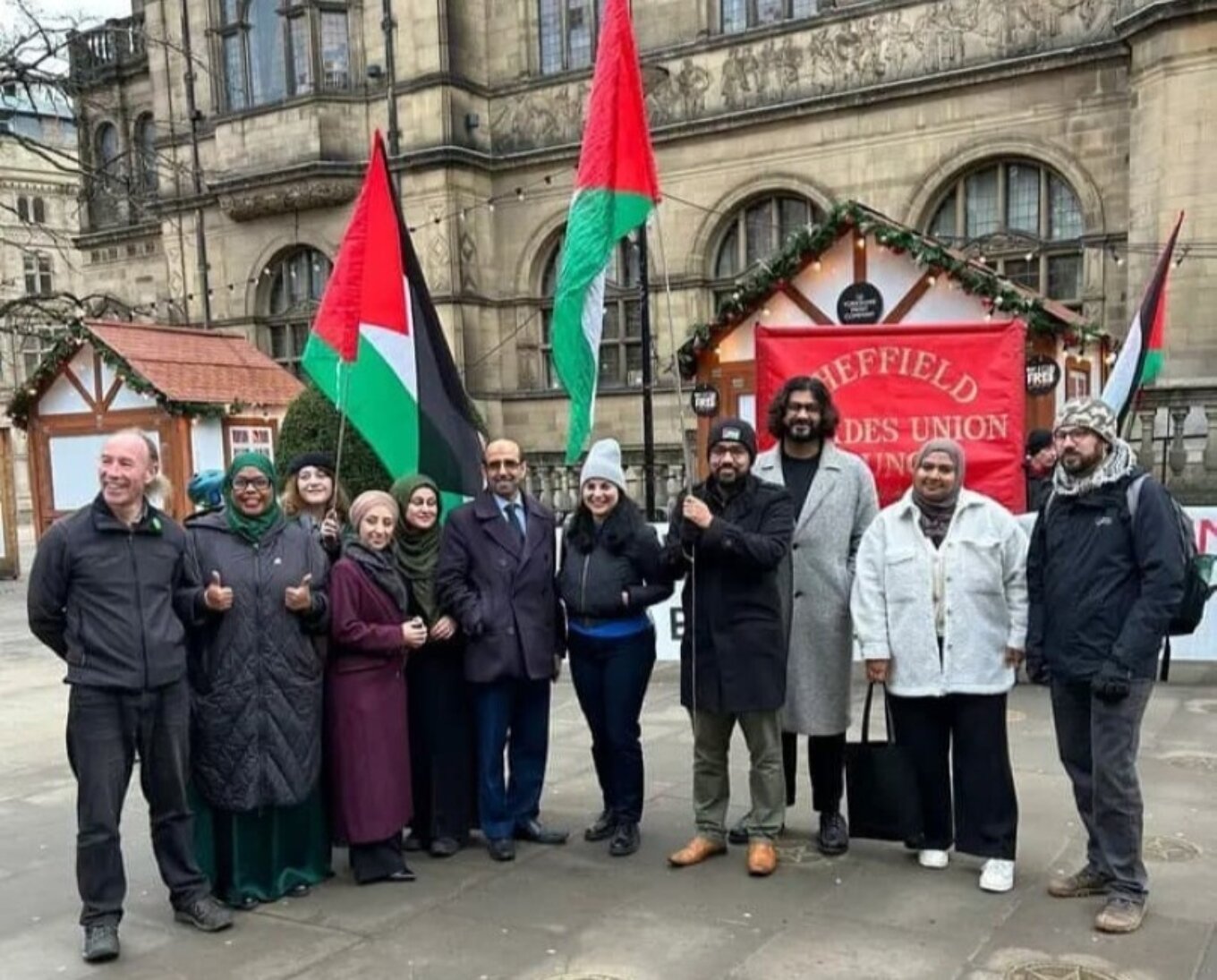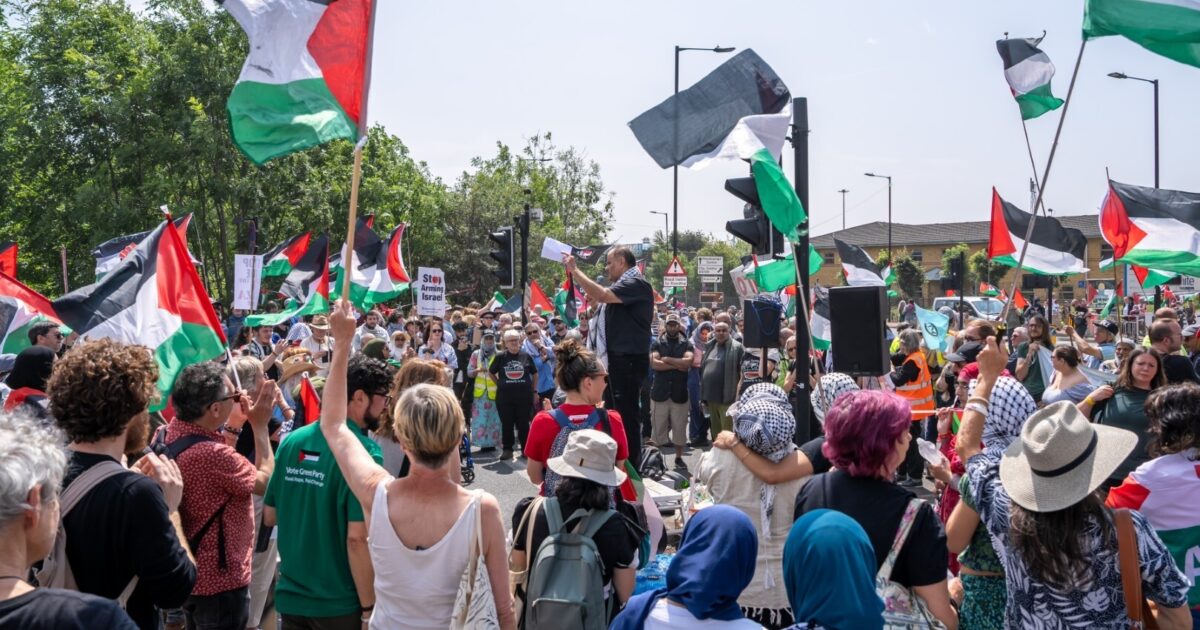
A protest yesterday outside the Meadowhall office of Forged Solutions.
Sheffield Palestine Campaign Against Israeli Apartheid.
In November 2023, Sheffield made national headlines as the first city council in the UK to vote to call for a ceasefire in Gaza. Others soon followed. The motion, passed amid mounting civilian casualties and international calls for de-escalation, was lauded by many as a bold act of solidarity. It was, and remains, a significant gesture – a moment of moral clarity from a local authority at a time when national governments around the world hesitated.
Yet today that principled stand sits in sharp contrast to an uncomfortable local reality: Sheffield is home to arms manufacturers whose products are being used in the very war the council opposes. Factories here are supplying components to major arms firms, contributing to a military supply chain that finishes in Israel. These weapons are deployed in military operations that leading human rights organisations such as Amnesty International and Human Rights Watch say amount to war crimes. The contradiction is as stark as it is painful: how can a city call for peace while enabling the machinery of war?
This dissonance is particularly striking in Sheffield, a city proud of its heritage as a place of makers. From forging steel for railways and cutlery to supplying materials for shipbuilding, Sheffield’s history is inseparable from industry and production. Our tradition is a source of civic pride, but it cannot be used to justify modern atrocities. The skills and ingenuity that built this city should be harnessed in the service of people and the planet, not in the production of weapons for warfare and the destruction of civilian lives. We must ask ourselves what kind of city we want to be: one that facilitates war, or one that builds a future grounded in peace, justice, and human rights.
“Have they no human decency and no shame?”@SheffieldPSC have called on the South Yorkshire Pensions Authority to divest from companies with ties to the ongoing genocide in Gaza – as well as £1.9 million in direct Israeli government bonds.@SamMGreg ✍️https://t.co/cLithGgKeY
— Now Then Magazine (@nowthenmag) June 6, 2025
This is not an abstract issue. A joint report from the Palestinian Youth Movement, Progressive International, and Workers for a Free Palestine revealed the extent of UK complicity since Israel’s assault on Gaza began in October 2023. Even after the UK government’s suspension of 30 arms export licences to Israel in September 2024, military shipments have continued. The report identified 8,630 separate consignments of bombs, grenades, missiles, and other munitions sent from the UK to Israel after those suspensions took effect. Most disturbingly, it details the ongoing direct supply of F-35 fighter jet components; aircraft that have played a pivotal role in Israel’s destruction of Gaza.
A recent UN report confirmed what many feared: bombs carried by F-35s have been used in “emblematic” cases of indiscriminate and disproportionate attacks on Gaza, resulting in mass civilian casualties and widespread devastation of homes, schools, hospitals, and other infrastructure. When announcing the partial licence suspensions, the UK government acknowledged that supplying F-35 parts would present a “clear risk” of contributing to serious violations of international humanitarian law. Yet those supplies continue, which the joint report concludes places the UK at risk of breaching its obligations under international law.
In Sheffield, Forged Solutions allegedly manufacture F-35 parts destined for Israel (the company deny this*). Just last week, arms giant BAE Systems opened the doors of its new multi-million pound factory in the city, which has been labelled the “home of UK artillery production”

Councillors Nabeela Mowlana and Minesh Parekh with other local politicians outside Sheffield Town Hall.
For many residents and councillors, the ceasefire vote was the fulfilment of a moral duty. It reflected Sheffield’s long tradition of internationalism and peace activism, from standing against apartheid in South Africa in the 1980s to becoming the UK’s first City of Sanctuary for refugees in 2007. But we must be honest. Meaningful solidarity cannot stop at motions passed in council chambers. It demands economic and political courage including the rejection of arms contracts and scrutiny of public procurement. This becomes particularly important in the face of genocide.
We continue to call for peace, but there can be no peace without justice. Martin Luther King Jr spoke of a “negative peace, which is the absence of tension” counterposed with a ”positive peace, which is the presence of justice”. Far more action is needed in our pursuit of justice.
The UK remains one of Israel’s key arms suppliers, with export licences worth hundreds of millions of pounds approved in recent years. Campaigners rightly argue that local resistance – through council policy, public divestment, trade union action, and sustained protest – can help generate the national pressure needed to end this complicity.
Reeves is wrong.
More military spending does not bring safety and security.
It brings more death, destruction – and profits for arms dealers. pic.twitter.com/I5lOu9MFPW
— CAAT (@CAATuk) June 11, 2025
In Sheffield, protests continue. Communities have blockaded arms factories, held vigils outside council buildings, and filled council meetings with searching questions about the city’s role in the ongoing genocide. These acts are not fringe disruption; they are expressions of the democratic principle that citizens have both a right and a responsibility to challenge injustice carried out in their name.
Sheffield’s ceasefire vote was a moral stand. But words without action risk becoming a shield for inaction – or worse, a smokescreen for complicity. The people of Sheffield now face a choice. Will our city’s proud legacy of peace-making and international solidarity be honoured through concrete action, or will it be undermined by the quiet hum of factories fuelling atrocities abroad?
As Israel continues to commit genocide in Gaza and evidence of the UK’s role in this catastrophe mounts, it is not enough for Sheffield to say it stands for peace. It must prove it, and it must do so in deeds as well as words.
*The Campaign Against the Arms Trade (CAAT) have published a document on their website which says that Forged Solutions are involved in the production of parts for the F-35, based on a list published in November 2023 by the Department of Business and Trade. Forged Solutions published a statement yesterday saying that it was not true that they manufacture F-35 parts in Sheffield, but did not clarify whether that means they don’t manufacture F-35 parts at any of their sites. Now Then attempted to clarify this with the company multiple times by both phone and email, but were unable to speak to anyone.
